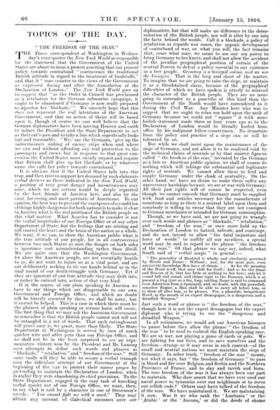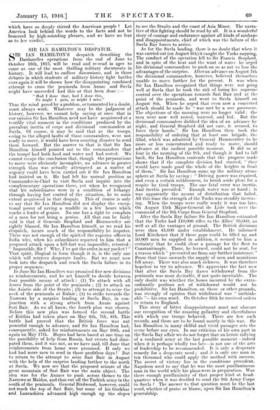TOPICS OF THE DAY.
■ -•-■410.-■
"THE FREEDOM OF THE SEAS."
THE Times correspondent at Washington in Wednes- day's issue quotes the New York World as responsible for the statement that the Government of the United States are about to issue a protest asserting that our present policy towards contraband "contravenes the traditional British attitude in regard to the treatment of foodstuffs," and that it "runs counter to the views of the Government as expressed during and after the formulation of the Declaration of London." The New York World goes on to suggest that " as the Order in Council was proclaimed as a retaliation for the German submarine campaign, it ought to be abandoned if Germany is now really prepared to al2andon her ' blockade.'" We sincerely hope that this does not represent the real intentions of the American Government, and that no action of theirs will be based upon it, though of course we can well believe that the German diplomatists have been moving Heaven and earth to induce the President and the State Department to act as their cat's-paw and to take a line which superficially looks fair and reasonable. 'We,' say the Germans, ' give up the indiscriminate sinking of enemy ships when and where we can and without affording any real protection to the passengers and crews, but in response to that great con- cession the United States must sternly request and require that Britain shall give up her blockade, or by whatever name she calls her policy towards contraband.'
It is obvious that if the United States falls into this trap, and then tries to support her demand by such elaborate verbal devices as those indicated in the New York World, a position of very great danger and inconvenience may arise, which we are certain would be deeply regretted by the best friends of America here, and also by the -most far-seeing and most patriotic of Americans. In our opinion, the best way to prevent the emergence of a condition of things highly dangerous for both nations is to make it clear to America what is the real position of the British people on this vital matter. What America has to consider is not the verbal ineptitudes of our Foreign Office or of any other Department of State, but the feelings that are stirring and will control the heart and the brain of the nation as a whole. We want, if we eau, to show the American public what is the true attitude of our people, for in all controversies between two such States as ours the danger on both sides is ignorance and misunderstanding rather than illwill. We are quite sure that the Washington Government, let alone the American people, are not essentially hostile to us, do not want to injure us at a vital point, and are not deliberately seeking to tie our hands behind us in the final round of our death-struggle with Germany. Yet if they are ignorant of our true attitude they may drift into, or rather be enticed into, action of that very kind. If in the course of our plain speaking to America we have to say things which are disagreeable to our own Government and Foreign Office, and which no doubt will be bitterly resented by them, we shall be sorry, but it cannot be helped. This is a case in which there must be the plainest of plain speaking or serious harm will ensue. The first, thing that we may ask the American Government to remember is that the British people cannot and will not be entangled in a net of words. That such entanglement will prove easy is, we grant, more than likely. The State Department at Washington is served by men of much quicker wits and abler pens than our Foreign Office, and we shall not be in the least surprised to see an argu- mentative victory won by the President and Mr. Lansing over attempts to define such words and phrases as "blockade," "retaliation," and "freedom of the seas." Still :!nore easily will they be able to scours a verbal triumph over the ridiculous attempt of our Government at the beginning of the war to protect their amour propre by pretending to maintain the Declaration of London, when in reality they were abandoning its chief provisions. To the State Department, engaged in the easy task of knocking verbal sparks out of our Foreign Office, we want, then, to say •what is said by a character in one of Stevenson's novels : " You cannot fight me with a word." They may obtain any amount of dialectical successes over our diplomatists, but that will make no difference to the deter- mination of the British people, nor will it alter by one iota the facts behind the words. Call it a blockade, a policy of retaliation as regards war zones, the organic development of contraband of war, or what you will, the fact remains that, come what may, we mean to use our sea power to bring Germany to her knees, and shall not allow the accident of the peculiar geographical position of certain of the neutral Powers to defeat a policy essential to our existence as a free people. Germany Is a besieged nation, and we are the besiegers. That is the long and short of the matter.
To imagine that we are going to raise the siege, or maintain it as a bloodstained sham, because of the geographical difficulties of which we have spoken is utterly to misread the character of the British people. They are no more going to surrender to a punctilio of this kind than the Government of the North would have surrendered to it during the Civil War. Any Minister here who was to suggest that we ought to relax our hold upon the neck of Germany be cause we could not " square ' it with some foolish statement made three or four years ago as to the Declaration of London would be literally hurled from office by his indignant fellow-countrymen. No departure from the policy and practice of a siege can or will be tolerated by us.
But while we shall insist upon the maintenance of the siege of Germany, and not allow it to be rendered void by the technical claims of neutrals or by that sinister figment called " the freedom of the seas," invented by the Germans as a lure to American public opinion, we shall of course do nothing which will infringe the substantial and legitimate rights of neutrals. We cannot allow them to feed and supply Germany under the cloak of neutrality. On the other hand, we have no desire to make them suffer any unnecessary hardships because we are at war with Germany-. All their just rights will of course be respected,' even though we cannot concede that Germany must be supplied with food and articles necessary for the manufacture of munitions as long as there is a neutral label upon them and somebody is willing to swear that they are not consigned to German merchants or intended for German consumption.
Though, as we have said, we are not going to wrangle over such words and phrases as" blockade," retaliation," and freedom of the seas," or once more hold up the Declaration of London to hatred, ridicule, and contempt, and do not, intend to allow "the fatal imposture and force of words" to nullify all our sacrifices, a special word may be said in regard to the phrase "the freedom of the seas." Of that phrase we may say, indeed, what South said of verbal magic" in general :— " The generality of Mankind is wholly and absolutely governed by Words and Names : Without ; nay, for the most part, even against the knowledge Men have of things. . . . As for the meaning of the Word itself, that may shift for itgelf : And as for the Sense and Reason of it, that has little or nothing to doe here; only let it sound full and round, and chime right to the Humour, which is at present a Gog (just as a big, long, rattling Name is said to command even Adoration from a Spaniard), and, no doubt, with this powerfull, senseless Engine, a Man shall be able to carry all before him, or to draw all after him, as he pleases. For, a plausible, insignificant Word, in the mouth of an expert Demagogue, is a dangerous and a dreadfull Weapon."
Just such a word or phrase is "the freedom of the seas," though here it is not the expert demagogue but the expert diplomat who is trying to use the dangerous and dreadfull Weapon."
In all seriousness, we would ask our American kinsmen to pause before they allow the phrase "the freedom of the seas" to be used to embroil the English-speaking race. We are at war, not playing a game of cards or polo. We are fighting for our lives, and to save ourselves and the freedom—strange as it may seem in such context—of the small and neutral nations we must maintain the siege of Germany. In sober truth, "freedom of the seas" means,' not what it says, but "the freedom of Germany" to pass in blood and fire over Belgium and Serbia and the Northern Provinces of France, and to slay and ravish and burn. The true freedom of the seas it has always been our part to maintain. Who dare assert that we have ever used our naval power to tyrannize over our neighbours or to serve our selfish ends ? Others may have talked of the freedom of the seas. We have maintained it. We are maintaining it now. Was it we who sank the Lusitania ' or the • Arabic ' or the 'Ancona,' or did the deeds of shame which have so deeply stirred the American people ? Let America look behind the words to the facts and not be bemused by high-sohnding phrases, and we have no fear as to her verdict. .



































 Previous page
Previous page